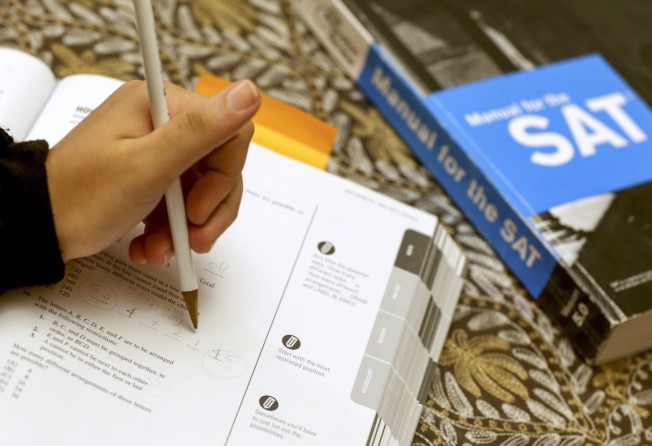Cracking down on SAT exam prep industry could help Beijing stem student 'brain drain'
Kelly Yang says concern over a student brain drain could lead Beijing to target SAT exam prep centres, with far-reaching consequences

Imagine having to recite the United States' pledge of allegiance before buying a handbag. That's how Beijing views the heavy emphasis on US founding documents in the new SAT - the standardised exam for US university admissions. The coveted handbag here is an American education.
In August, I wrote about the new SAT's focus on US founding documents and how it will affect China. Xinhua called the new SAT a new form of "ideology intrusion" and "imperialism".
As China tries to limit what it sees as the "inappropriate Western influence" of students in the Hong Kong protests, Beijing will find the threat of more ideological intrusion worrying. Beijing, Fudan and Sun Yat-sen universities all vowed recently to have stricter ideological control over students.
Yet exams are trickier to control than weibo posts. Chinese students, on average, study 10 times harder for the SAT than US students - an estimated 150-200 hours compared with 20-30 hours. From 2016, when the SAT changes, they will spend those hours poring over the US Bill of Rights and American civil liberties, including the right to democracy.
The question is not whether Beijing will crack down on the new SAT - it will: but how? The exam is not administered on the mainland, but over the border in Hong Kong, so Beijing can't "ban" it. Far more effective would be to ban test preparation. For this, China already has full jurisdiction.
Like Hong Kong, all mainland after-school tutoring and test prep centres are regulated by the Ministry of Education, which issues licences before they can operate. But the rules for registration are vague and complicated and many operate illegally. Beijing can easily step up the regulations; if it wanted to, it could crush the new SAT in a second.
Even without the new threat of ideological intrusion, exams such as the SAT and TOEFL are in a precarious situation, because of China's huge brain drain. Today there are 235,000 mainland students at US universities. Once they go abroad, they tend to stay abroad. In 2013, 8.5 million Chinese were living abroad, while only 848,000 had moved to China, says a report by the Centre for China & Globalisation. The People's Daily calls it "the world's worst brain drain".
China has tried to solve the problem by attracting more foreign students. Recently, Beijing University set up its Yenching Academy, an all-expenses-paid, one-year graduate programme aimed at foreigners.
However, such programmes do not solve the core problem - the annual student vanishing act. Cracking down on the SAT test prep industry might.
If China does shrink its brain drain, the ramifications will be huge. It's to America's advantage that the Chinese have an insatiable appetite for US education, and that US universities don't just serve Americans, but the world.
Ultimately, Beijing may complain that the new SAT is unfair because it is like making its people recite the pledge of allegiance before buying a handbag. But the truth is, Beijing doesn't want its people buying that handbag any more - pledge or no pledge.
Kelly Yang teaches SAT at The Kelly Yang Project, an after-school centre for writing and debate in Hong Kong. She is a graduate of UC Berkeley and Harvard Law School. http://www.kellyyang.edu.hk/kelly/